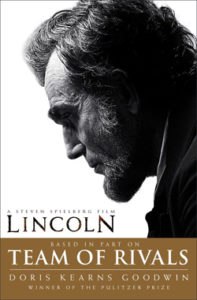Doris Kearns Goodwin – Critical Presidential Leadership Traits
What key principles of presidential leadership make a critical difference?
History tells an interesting tale. During a recent insightful presentation in Indianapolis, legendary presidential historian Doris Kearns Goodwin quoted the New York Times: “We are no longer a people. We have become a mob.”
 Was she speaking about today, a time that Dr. Goodwin described when many hold “hope mixed with anxiety and fear” in a Donald Trump administration? Ironically, the NYT quote actually emerges from the political battlefield of the Taft-Roosevelt split in the early 1900s.
Was she speaking about today, a time that Dr. Goodwin described when many hold “hope mixed with anxiety and fear” in a Donald Trump administration? Ironically, the NYT quote actually emerges from the political battlefield of the Taft-Roosevelt split in the early 1900s.
Even though America is popularly described today as deeply divided, it is neither the first time nor the worst it has been in this position, according to Dr. Goodwin, a Pulitzer Prize winner and author of the brilliant Lincoln biography Team of Rivals.
The United States has faced deep and divisive uncertainty on numerous occasions. She noted high anxiety over emerging technology, dramatic social change, and demographic upheaval all but engulfed America with the coming of the Industrial Revolution in the late 1800s and early 1900s. The same grievous angst materialized before the election of Abraham Lincoln – a man widely thought to possess no chance of winning the presidency – during which open gunfights broke out and Americans died over presidential political arguments. The ultimate result of that division was the wrenching War Between the States, the so-called 1861-1865 “Civil” War.
Casting the current political environment as “echoes from the past,” Dr. Goodwin (known as “America’s historian-in-chief”) explained how rural Americans and others of the “quiet majority” have again flexed their political muscle, with millions now focused on “restoring lost dignity and power.” Think that today’s media is biased? Have concern about “fake news”? Disgusted that the pollsters and political pundits completely missed Again, according to Dr. Goodwin, neither is a new concept and Americans have experienced both time and again. Unchecked “yellow journalism” (emphasizing sensationalism over facts) led directly to the Spanish-American War (1895-1898).
“Having the right people in the right place at the right time means great things can be accomplished.”
So if our division today represents but a historic cycle of sorts, a response of a democratic process that has emerged before, what are keys to future success? History offers some surprising answers, all applicable in nearly any setting.
A prolific author of deeply researched works on Lincoln, Theodore Roosevelt, John F. Kennedy, Lyndon Johnson and others, Dr. Goodwin offered seven general principles of presidential leadership success in her talk. Here they are:
Successful leaders develop good temperament This leadership trait represents a difficult challenge for many. Top leaders will be criticized. It comes with the job. Temperament refers to a person’s nature or disposition. “Good” temperament refers to the internal capacity to quiet emotions and not let anger get the best of one when one is insulted or criticized. Acting in anger is bad policy and for the most part bad leadership. Effective leaders develop the capacity to “step out of the game” on occasion and get re-centered emotionally and cognitively.
 Successful leaders learn from failure Even the strongest and best leaders will lose on occasion. Through failure (like being defeated while running for political office), leaders like Abraham Lincoln “learned patience, learned humility, learned resilience,” according to Dr. Goodwin. She noted that Franklin Roosevelt refused to be defeated by devastating polio. Instead, FDR’s paralysis from polio “expanded his mind” and tempered his previous worldview as a member of a “privileged class” through enforced humility.
Successful leaders learn from failure Even the strongest and best leaders will lose on occasion. Through failure (like being defeated while running for political office), leaders like Abraham Lincoln “learned patience, learned humility, learned resilience,” according to Dr. Goodwin. She noted that Franklin Roosevelt refused to be defeated by devastating polio. Instead, FDR’s paralysis from polio “expanded his mind” and tempered his previous worldview as a member of a “privileged class” through enforced humility.
Leaders put people around them who disagree with them Lincoln deployed the brilliant strategy of building an indispensable team of his previous rivals. This “Team of Rivals” “could veto each other” and produced an extraordinary strategic lineup that balanced each other during one of the most tumultuous times in American history. Certain levels of conflict represent a healthy approach to comprehensive decision-making. “Yes” men or women can allow delusional thinking to go unchecked.
Successful leaders inspire the best in their teams Theodore Roosevelt believed with cause that the ability to “develop ordinary qualities to an extraordinary degree” was a major pathway to success. Procrastination is a mortal sin for leaders. Get it done now, and encourage and inspire your team members to excel. Encouragement from leaders is a game-changer.
Successful leaders have an ability to relax and replenish energy Lincoln visited the front lines and the soldiers’ camps to listen, inspire and encourage through his legendary gift of story-telling. He could tell stories for hours, relaxing both him and those he visited with humor and insight. In 1941, at the height of global tension, Winston Churchill accepted an invitation from Roosevelt to stay at the White House. Probably no one knew that the White House visit would last an entire 21 days and nights, with Roosevelt and Churchill frequently staying up until 2 or 3 in the morning talking and planning (as well as smoking cigars and drinking brandy).
Successful leaders can cool down and control their emotions Directly related to Point No. 1 (positive temperament), successful leaders in history developed specific means to release anger and control themselves when every urge was to lash out. Dr. Goodwin referred to what Lincoln called his “hot letter ritual.” Lincoln would write out an angry letter, pouring out his emotions. Then he would let the letter sit and finally destroy it without mailing it. FDR would draft out whole speeches where people who offended him were specifically castigated. This worried staff members, until they realized that as drafts proceeded to more refined states, Roosevelt himself would gradually self-edit out offending passages as emotions cooled.
Successful leaders learn how to resonate with their colleagues and countrymen Lincoln and Roosevelt knew when it was time to use plain language and when it was time to be eloquent. Lincoln had an unmatched ability to speak remarkable phrases that have stood the test of time. Teddy Roosevelt deployed punchy anecdotes: “Square deal,” “bully pulpit” (Teddy actually created the Maxwell House coffee slogan: “Good to the very last drop”). FDR knew instinctively how to time his “Fireside chats” to attract an astonishing 80% of the available radio audience.
Today’s leaders have to consider that their audiences read, listen or watch fragmented media that is easily customized to their tastes and outlooks, whether conservative or liberal. Social media gives everyone a digital megaphone, good or bad, but loud. The “presidential” Golden Globes speech of Oprah Winfrey underscores that power.
Positive leadership traits remain critical to success. Dr. Goodwin’s last word? “Having the right people in the right place at the right time means great things can be accomplished.”
By Michael Snyder, Managing Principal MEK Group
